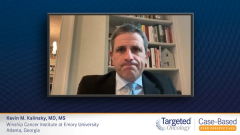
Case Overview: A 65-Year-Old Woman With HR+/HER2-low Metastatic Breast Cancer
Expert oncologist Kevin Kalinsky, MD, reviews the diagnosis and management of a 65-year old woman with HR+/HER2-low metastatic breast cancer.
Episodes in this series

Transcript:
Kevin Kalinsky, MD: Hi, I’m Kevin Kalinsky. I’m the director of the Glenn Family Breast Center at Winship Cancer Institute in Atlanta, Georgia. I’m a breast medical oncologist. This is a case of a 65-year-old postmenopausal woman who has a history of breast cancer, who comes to the emergency [department] with chest pain and shortness of breath. The patient history is that she was diagnosed with stage I hormone receptor-positive, HER2-negative breast cancer 6 years ago, so this was at the age of 59. At the time she was prescribed 5 years of adjuvant letrozole, which she completed 1 year ago. And we’ll presume that she had local therapy, like surgery and appropriate radiation therapy as well.
Then she underwent a chest, abdomen, pelvic CT, which showed a solitary lesion on the right lower lobe of the lung. This led to getting a biopsy, which confirmed hormone receptor positivity. It is HER2 1+, FISH [fluorescence in situ hybridization] nonamplified. She has a performance status of 1, and next-generation sequencing is conducted, which is negative for any actionable alterations. Then she receives anastrozole and ribociclib as her first line of treatment for metastatic disease. Eighteen months after treatment initiation, she undergoes a CT scan, which shows enlargement of the preexisting lung lesion, as well as additional lesions in the lung. A liquid biopsy is performed at that time, and ctDNA [circulating tumor DNA] testing is negative for ESR1 and PIK3CA mutations. The patient presents to discuss next steps.
This is a kind of patient we can see in the clinic. Also to take a step back, there are certainly patients we see who have early stage breast cancer and have genomic assays that suggest they don’t need chemotherapy. This particular patient did not undergo adjuvant chemotherapy and then develops a recurrence. This is certainly something that we see. This is a subtype of breast cancer for which we can see late recurrences, recurrences that happen after 5 years. There are also data that if patients come in and they are presenting symptomatic wise, there are data supporting utilizing endocrine therapy and ribociclib, or a CDK4/6 inhibitor, compared to chemotherapy. Like the RIGHT Choice study that was conducted showed that giving combination endocrine therapy and a CDK4/6 inhibitor was better than doublet chemotherapy. Also, this patient had a recurrence that was more than 12 months from when she completed her adjuvant endocrine therapy. She did not have an ESR1 mutation that was detected at that time. It’s totally appropriate for the patient to go on to an AI [aromatase inhibitor] and a CDK4/6 inhibitor, which is demonstrated in this case. The patient was on this for about a year and a half.
Historically, including when I was in training 100,000 years ago, we would define HER2+ or HER2-. If somebody had a IHC [immunohistochemistry result] that was 3+ or was FISH-positive amplified, that was HER2+, and if it was not that, then it was HER2-. With the results of the Destiny-Breast04 trial, however, we saw for patients who had pretreated hormone receptor-positive or hormone receptor-negative disease, that there was a benefit for giving trastuzumab deruxtecan in patients who have HER2-low breast cancer. So that’s HER2 1+ or 2+ and nonamplified. Right now, we’re not giving that sort of treatment for patients who have an IHC that’s lower than that. There is a question in the field about the potential role of HER2 antibody-drug conjugates like trastuzumab deruxtecan in the context of HER2 ultra-low, which are those that have more than 0 but less than 1, so that group that’s a bit less than the indication right now. But that’s not something that has treatment implications at this time, or at least until we see the results of DESTINY-Breast06, which is going to include patients with HER2 ultra-low disease.
This particular patient right now I don’t think has endocrine-resistant disease. One, when the patient had her aromatase inhibitor and had tumor progression more than a year later, that’s demonstrating some degree of endocrine sensitivity. We get concerned when patients recur at a short time that’s less than that, and we really get concerned if patients have tumors that progress on endocrine therapy. I think the other thing for this particular patient is that she was on her endocrine therapy and CDK4/6 inhibitor for frontline therapy for a year and a half. It’s not like she was on that for 3 months or less than 6 months. Those are patients who have tumors that we get worried about the degree of how sensitive they’ll be to endocrine therapy. This patient has demonstrated some endocrine sensitivity, and her next step I would argue would be an endocrine therapy-based treatment.
Transcript edited for clarity.










































